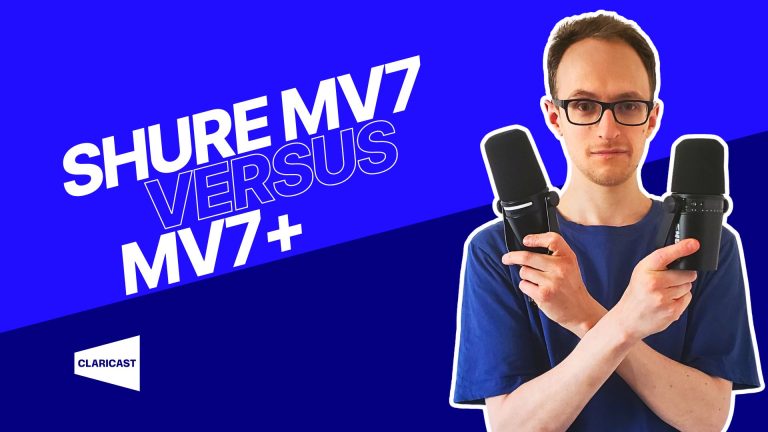Podcasting is a form of digital content creation that has blown up in recent years. You’ve probably heard of them, maybe you’ve listened to a few, or you may have your own podcast.
Wherever you sit on the spectrum of podcasting knowledge, in this post, we’re going to clear some things up for you.
As the title suggests, we’re going to cover ‘what is a podcast and how does it work’. But these days, it’s not so cut and dry as a simple definition. The podcasting landscape is changing, and so is how we define what a podcast is.
Let’s jump in.
What Is A Podcast?
At its core, a podcast is like an on-demand, online radio or TV show. It’s a series of recorded audio or video episodes that you can listen to or watch on your computer, smartphone, or any other device with internet access.

Each podcast is usually centred around a specific topic. Podcasters may choose to create and publish an episode consistently every week for years, or a podcast might be a short, limited-run season. Or anything in between!
Podcasts have been around since the early 2000s. The name “podcast” is a blend of “iPod” and “broadcast,” but don’t let that fool you (like it fooled me all those years ago!) — podcasts are not limited to iPods.
One defining component that most would say makes a podcast a podcast is the use of RSS feeds. An RSS feed is basically a file hosted on the internet that automatically updates when new podcast episodes are released, making it easy for listeners to subscribe and receive the latest episodes.
These days, the definition of a podcast is becoming more fluid. More on that later…
How Does a Podcast Work?
Let’s run through the general process.
Content Creation
It all starts with someone who’s passionate about creating content around a particular topic. This could be anything from true crime stories or comedy to finance or life coaching. They might want to create content as a hobby, or as a marketing tool for their business.
Podcasters create episodes by recording audio and/or video content. They may be a solo host recording on their own, or they might interview a guest each episode.

Editing & Production
A podcast is rarely recorded in one take and published as is. And it’s not the best idea to do so. Podcasters often edit their recordings (or use an editing service) to remove mistakes, add music, and enhance the overall quality. This step ensures that the final product is polished and enjoyable to listen to or watch.
There are millions of podcasts out there, and this step is essential for a podcast to stand out.
Hosting
Once an episode is ready, it needs a home on the internet. This is where podcast hosting comes in. Podcast hosts are online platforms that store your audio or video files, generate the RSS feeds, and make the podcast accessible to listeners all around the world.
Listeners can access these episodes via podcast players/apps such as Spotify, Apple Podcasts and YouTube.
Subscribing
As mentioned, an RSS feed allows listeners to ‘subscribe’ to a podcast. Listeners can tap subscribe/follow to a podcast on their preferred podcast app (e.g. Spotify). Listeners will then get new episodes popping up in the app as soon as they’re published.
Listening/Watching
The beauty of a podcast is that listeners can enjoy them on their own schedule. There’s usually no imperative need to listen to an episode the moment it releases (the super-fans probably will, though!)
Listeners also have no obligation to only use one particular platform. Most podcasts are available on any podcast player/app – unlike many other forms of media that are more restrictive.
Engagement
Many podcasts have engaged communities of listeners who provide feedback and share episodes on social media or directly with friends/colleagues. Most podcast players/apps have a built-in review function so that listeners can provide feedback.
Some podcasters may choose to extend their offering to their listers by creating closed communities or creating companion content in another format, like YouTube videos.

Podcasting Is Changing
While the traditional definition of a podcast is audio content distributed via an RSS feed, the podcasting landscape has evolved over the years. Video podcasts have gained popularity, blurring the lines between traditional podcasts and YouTube channels.
Video podcasts (or “vodcasts”/”vidcasts”) offer the same episodic format as their audio counterparts but with the added benefit of visual content. They allow creators to offer demonstrations, or simply provide a more engaging experience. Many podcast hosts now allow podcasters to upload both an audio and video version of each episode.

Some may define their content as a podcast, even if it’s only published internally within an organisation or as a paid download via a closed service like Patreon. There is some debate around whether this kind of content fits the definition of a podcast.
The term “podcast” is starting to become an umbrella term that encompasses a wide range of audio-focused digital content. Semantics aside, though, podcasts are a fantastic form of educational or entertainment content. And if you’re not already involved, there’s probably the perfect podcast out there waiting for you to hit that subscribe button and join the conversation!




